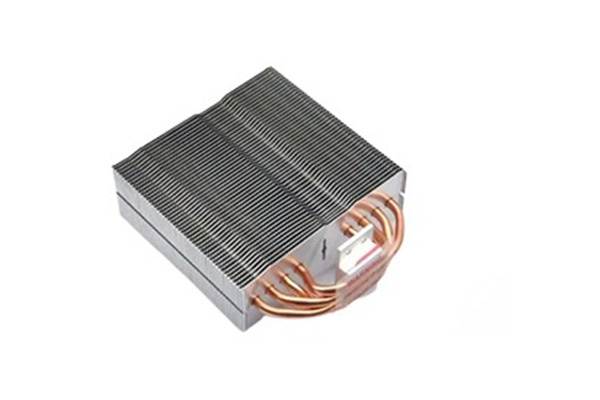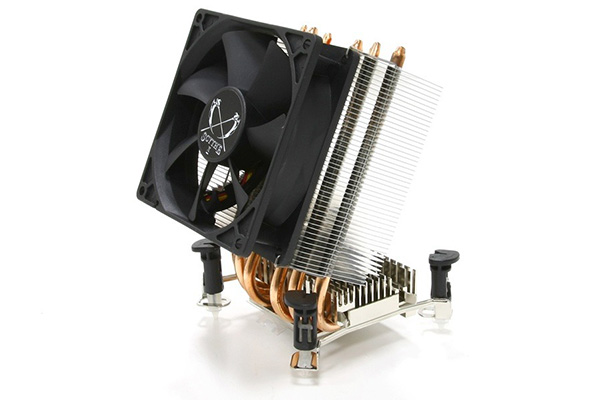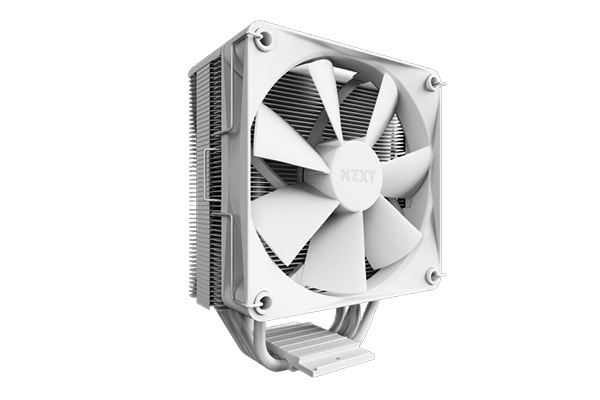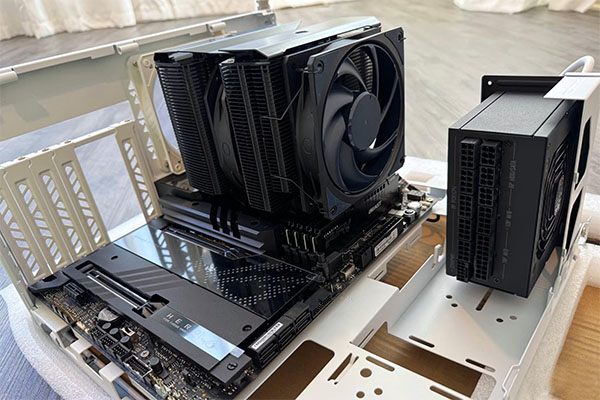Introduzione
When it comes to maintaining optimal performance in high-powered machines, one of the most important components is cooling. In particular, silent CPU coolers are becoming increasingly popular for those who need to ensure quiet operation without compromising on performance. This article explores the best silent CPU coolers for AI and server cooling, addressing key considerations such as types of coolers, cooling requirements, and the latest technologies in silent CPU cooling. If you’re considering upgrading your system or building a new one, understanding the best options for silent cooling is essential for ensuring reliability, efficiency, and longevity.

1. What is a CPU cooler, and why do you need one?
A CPU cooler is a vital component for any computer, especially in high-performance systems such as those used in AI computing or server environments. It works by transferring heat from the CPU to an external heat sink or cooler, where it is dissipated into the surrounding air. But why exactly do you need one?
In the absence of a proper cooler, a CPU can overheat, which might lead to throttling, system instability, or even permanent damage. This is where the right CPU cooler comes into play. It ensures that the CPU operates within safe temperature ranges, maintaining consistent performance and extending its lifespan.
Now, let’s dive deeper. The cooling process is crucial for any high-performance machine. CPUs generate heat during operation, and without an efficient way to manage this heat, your system can experience a slowdown, which is especially critical for AI computations and large-scale server environments. A silent CPU cooler addresses this challenge, providing cooling while minimizing noise levels. Here’s the kicker: finding a balance between effective cooling and quiet operation can significantly improve both your system’s performance and your working environment.
Table 1: Key Benefits of Using a CPU Cooler
| Beneficio | Descrizione |
|---|---|
| Improved performance | Keeps the CPU temperature within optimal ranges, preventing slowdowns. |
| Longevity | Reduces wear on components by preventing overheating. |
| Noise reduction | Silent CPU coolers minimize operational noise while maintaining performance. |
| Reliability | A good cooler ensures stable performance even under heavy loads. |
2. What are the different types of CPU coolers?
When shopping for a CPU cooler, you’ll come across several types of coolers, each with its pros and cons. But here’s the kicker: choosing the right one depends on your specific needs, including the size of your build, the level of noise you can tolerate, and the performance required.
The most common types of CPU coolers include air coolers, liquid coolers, and hybrid coolers. Air coolers consist of a heat sink with fans that dissipate heat, while liquid coolers use a pump, radiator, and liquid to transport heat away from the CPU. Hybrid coolers combine both systems for superior cooling.
Let’s break down the differences. Air coolers are typically less expensive and simpler to install, making them a popular choice for home PCs. However, liquid coolers are generally more efficient, especially in high-performance systems where heat generation is significant. The added benefit of liquid coolers is their ability to handle overclocking more effectively, which is essential for AI computations. Hybrid coolers are often used in extreme cases, offering the best of both worlds.
Table 2: Comparison of Cooling Methods
| Cooler Type | Professionisti | Contro |
|---|---|---|
| Air Coolers | Easy installation, cost-effective | Limited performance on high-end CPUs |
| Liquid Coolers | Better heat dissipation, efficient | More expensive, complex setup |
| Hybrid Coolers | Combines air and liquid cooling | High cost, requires more space |
3. How do silent CPU coolers work?
Silent CPU coolers are designed to provide maximum cooling with minimal noise. But what’s the real story? The key lies in the technology behind these coolers. Typically, silent coolers feature advanced fan designs and efficient heat dissipation mechanisms that reduce noise levels significantly while still offering excellent cooling performance.
The key feature of silent coolers is their ability to maintain a low noise level without sacrificing performance. This is achieved through several design elements, including larger fans that can spin slower yet move more air, high-quality materials that absorb vibrations, and advanced fan blade designs that minimize turbulence. Silent coolers often feature sophisticated bearing systems that ensure smooth, quiet operation even under load.
Ready for the good part? These coolers are perfect for users who need to run high-performance machines in environments where noise can be distracting, such as in offices, studios, or data centers. Silent CPU coolers also typically use a heat pipe or copper base to enhance heat transfer, further improving cooling efficiency while keeping noise low.
Table 3: Silent CPU Cooler Features
| Caratteristica | Descrizione |
|---|---|
| Larger fan size | Larger fans move more air at lower speeds, reducing noise. |
| High-quality materials | Absorb vibrations, reducing sound. |
| Efficient heat dissipation | Heat pipes and copper bases help transfer heat away quickly. |
| Low RPM fans | Operate at slower speeds, creating less noise. |
4. What is the best CPU cooler for AI computing?
AI computing requires a powerful CPU cooler that can handle large computational tasks without generating excessive heat. But what’s the best cooler for the job?
The ideal CPU cooler for AI workloads should be capable of cooling a processor under sustained heavy loads. AI tasks, such as training deep learning models or running simulations, generate a significant amount of heat. Liquid coolers, especially those with high-performance radiators, are often the best choice for AI systems. Their ability to maintain lower temperatures under extreme stress makes them perfect for systems running AI algorithms.
But here’s where it gets interesting… liquid coolers aren’t always the right choice for everyone. For smaller, less demanding AI workloads, a high-end air cooler can provide enough cooling power. The important thing is to ensure that the cooler can handle long periods of high CPU usage without causing thermal throttling.
Table 4: Recommended Coolers for AI Computing
| Cooler Type | Best For | Recommended Brands |
|---|---|---|
| Liquid Coolers | High-performance AI workloads | Corsair, NZXT, Be Quiet! |
| Air Coolers | Less demanding AI tasks or smaller builds | Noctua, Arctic, Cooler Master |
5. What makes a CPU cooler suitable for server cooling?
Server environments require special consideration when it comes to cooling. The difference between server and consumer CPU coolers is significant—servers often operate 24/7 under heavy loads, generating substantial heat.
What makes a CPU cooler suitable for server cooling is its ability to maintain stable cooling over long periods of continuous operation. For servers, the most important factors are cooling efficiency, reliability, and noise levels. Servers are typically housed in data centers where noise is a concern, so using a silent cooler that doesn’t compromise on cooling power is critical.
Liquid coolers are often preferred for server cooling due to their superior heat dissipation capabilities, but silent air coolers can also be used in less demanding server environments. When selecting a cooler for server use, it’s important to consider factors like ease of maintenance, fan longevity, and noise reduction, which are crucial in server rooms where uninterrupted operations are necessary.
Table 5: Best CPU Coolers for Servers
| Cooler Type | Features | Miglior caso d'uso |
|---|---|---|
| Liquid Coolers | Efficient cooling, silent operation | Large server farms |
| Silent Air Coolers | Less complex, lower cost, quieter | Small to medium server rooms |
Conclusione
In conclusion, silent CPU coolers are a vital component for those working with high-performance machines, such as AI computing systems and servers. Whether you opt for an air cooler or liquid cooler, selecting a cooler that balances noise reduction with efficient cooling is crucial. The technology behind silent coolers continues to evolve, offering solutions that cater to the ever-growing demands of AI and server cooling needs. Ultimately, a well-chosen CPU cooler can improve both the performance and longevity of your system while ensuring a quieter, more productive work environment.

6. How do you choose the right silent CPU cooler for your PC?
Choosing the right silent CPU cooler for your PC isn’t always as straightforward as picking the most expensive or well-reviewed model. It requires careful consideration of several factors that can affect both performance and noise levels. So, what should you look for when choosing the perfect cooler for your needs?
When selecting a silent CPU cooler, the key factors to consider are:
- Compatibility: Ensure the cooler fits your case and motherboard. For example, large air coolers may not fit in compact cases.
- Cooling capacity: Make sure the cooler can handle the heat output of your CPU, especially if you’re planning to overclock.
- Noise levels: Always check the decibel (dB) rating of the cooler, as silent coolers are rated to operate under 30 dB.
- Aesthetic appeal: While not crucial for performance, some coolers come with RGB lighting, which can enhance your build’s overall look.
If you’re looking for a system that prioritizes both silence and cooling, opting for a high-quality air cooler or a liquid cooler with larger radiators is often the best choice.
Table 6: Key Factors to Consider When Choosing a CPU Cooler
| Fattore | What to Look For |
|---|---|
| Compatibility | Ensure it fits your case and motherboard |
| Cooling Capacity | Choose based on CPU’s heat dissipation needs |
| Noise Level | Look for coolers with low dB ratings (<30 dB) |
| Aesthetic Appeal | Consider RGB options if desired |
7. What features should you look for in the best silent air cooler?
When searching for the best silent air cooler, you need to look for specific features that ensure both quiet operation and efficient cooling. What makes an air cooler the right choice for your system?
The most important features to consider are:
- Fan size: Larger fans can move more air at lower speeds, resulting in quieter operation.
- Fan blades: The design of the fan blades influences the noise level. Look for blades designed to reduce turbulence.
- Heat sink design: Efficient heat sinks with a large surface area improve heat dissipation and overall cooling.
- Bearings: High-quality bearings reduce friction and noise, contributing to quieter operation.
By choosing a cooler with these features, you ensure better cooling and quieter operation, which is crucial for those who require silent performance for long hours of work or gaming.
Table 7: Features of the Best Silent Air Coolers
| Caratteristica | Descrizione |
|---|---|
| Large fan size | Moves more air at lower speeds for quieter operation. |
| High-quality fan blades | Reduces noise by minimizing turbulence. |
| Efficient heat sink design | Maximizes heat dissipation to improve performance. |
| Superior bearings | Reduces friction and noise from fans. |
8. How does an air cooler compare to a liquid cooler for silent cooling?
Raffreddatori d'aria and liquid coolers both offer advantages, but how do they compare when it comes to silent operation and performance?
- Raffreddatori d'aria: Generally quieter due to simpler designs and larger fans that can spin at lower speeds. However, they may not provide as much cooling power as liquid coolers in high-performance setups.
- Raffreddatori a liquido: While typically louder due to the pump and fans, liquid coolers often provide superior cooling, especially for overclocked CPUs or AI and server environments where consistent high performance is needed. Newer models, however, have advanced to offer quieter operation.
In general, if you’re looking for a balance between quiet operation and cooling performance, air coolers are often the best option. But if you’re dealing with high-performance tasks like AI computations or server cooling, a liquid cooler might be the better choice despite the slightly higher noise levels.
Table 8: Air Cooler vs Liquid Cooler Comparison
| Caratteristica | Air Cooler | Liquid Cooler |
|---|---|---|
| Noise Level | Generally quieter | Can be louder (due to pump) |
| Cooling Performance | Good for moderate usage | Better for high-performance systems |
| Maintenance | Low maintenance | Richiede più manutenzione |
9. What are some of the best brands for silent CPU coolers?
When it comes to silent CPU coolers, brand reputation matters. The top brands have spent years refining their designs and building trust with consumers.
- be quiet!: As the name suggests, this brand focuses on ultra-quiet cooling solutions. Their coolers are some of the best on the market, offering superior cooling with minimal noise.
- Noctua: Known for their high-quality air coolers, Noctua coolers are recognized for their quiet operation and long-lasting durability.
- Cooler Master: Offering a range of coolers, Cooler Master’s models are great for performance and noise control, with many of their products being highly rated for quiet operation.
These brands have earned a reputation for providing some of the best silent coolers, with reliable performance and low noise levels.
Table 9: Top Brands for Silent CPU Coolers
| Brand | Known For |
|---|---|
| be quiet! | Superior silent cooling performance |
| Noctua | Durable, quiet air coolers |
| Cooler Master | A range of performance and silent cooling solutions |
10. How to install a silent CPU cooler on your PC?
Installing a CPU cooler can seem daunting, but with the right steps, it’s a straightforward process. Here’s a quick guide:
- Rimuovere il vecchio dispositivo di raffreddamento: Carefully disconnect and remove the old cooler from your CPU.
- Pulisci la CPU: Wipe away any old thermal paste using a lint-free cloth and isopropyl alcohol.
- Apply new thermal paste: Place a small amount of thermal paste on the center of the CPU.
- Install the cooler: Attach the cooler to the CPU socket, making sure it’s aligned properly.
- Connect the fan: Plug the cooler’s fan into the motherboard or fan header.
- Test the cooler: Power on the system to ensure the cooler is running properly and the system is maintaining good temperatures.
Proper installation ensures that your cooler is working efficiently and quietly from the start.
Table 10: CPU Cooler Installation Steps
| Fare un passo | Azione |
|---|---|
| Rimuovere il vecchio dispositivo di raffreddamento | Disconnect and remove old cooler |
| Pulisci la CPU | Wipe away thermal paste with alcohol |
| Apply new thermal paste | Place a small dot of paste on the CPU |
| Install the cooler | Attach the cooler, ensuring proper alignment |
| Connect the fan | Plug in the cooler’s fan |
| Test the cooler | Check temperatures and fan operation |

11. Can silent CPU coolers be used in high-performance gaming rigs?
Gaming rigs require robust cooling solutions, but can silent CPU coolers meet the demands of gaming?
The answer is yes, silent coolers can be used in gaming rigs. While gaming can generate a lot of heat, especially when running high-performance games, a quality silent cooler can handle the load. High-end air coolers from brands like Noctua and be quiet! provide enough cooling power for overclocked CPUs without creating disruptive noise.
However, the cooler must be appropriately sized for your system and CPU. Liquid coolers can also be used in gaming rigs to handle even more intensive cooling needs, particularly in overclocked setups. The key is to balance performance with noise level, ensuring your gaming experience isn’t disturbed by loud cooling fans.
Table 11: Best Silent CPU Coolers for Gaming
| Cooler Type | Best For | Recommended Models |
|---|---|---|
| Air Coolers | Mid-range gaming rigs | Noctua NH-D15, be quiet! Dark Rock Pro 4 |
| Liquid Coolers | High-performance gaming rigs | Corsair iCUE H150i Elite, NZXT Kraken X73 |
12. What is the impact of silent cooling on system performance?
You may wonder if silent coolers are as effective as their louder counterparts. Here’s how silent cooling impacts system performance:
- Temperature regulation: Silent coolers are designed to regulate temperature without noise, ensuring your CPU stays cool even during intensive tasks.
- Stable performance: Lower temperatures prevent thermal throttling, which can slow down performance.
- Longer lifespan: Keeping the CPU cooler can extend its lifespan, as overheating is one of the main causes of CPU degradation.
In essence, silent coolers offer the same performance benefits as louder models, with the added bonus of reducing noise levels in your workspace.
Table 12: Impact of Silent Cooling on Performance
| Impatto | Descrizione |
|---|---|
| Temperature regulation | Maintains optimal CPU temperature, preventing overheating |
| Stable performance | Ensures consistent performance without throttling |
| Longer lifespan | Helps extend the lifespan of the CPU by preventing excessive heat |
13. What are the common problems with silent CPU coolers?
While silent coolers are great, they come with a few potential drawbacks. Common issues include:
- Noise inconsistency: Some coolers might start off silent but become noisy over time due to dust buildup or worn-out bearings.
- Cooling inefficiency: In some cases, silent coolers may not provide enough cooling for high-performance CPUs.
- Installation challenges: Some large air coolers can be difficult to install in tight spaces or may not fit in certain cases.
It’s important to regularly maintain your cooler to avoid performance drops and ensure it continues operating silently.
Table 13: Common Issues with Silent CPU Coolers
| Issue | Descrizione |
|---|---|
| Noise inconsistency | Coolers may get louder over time due to wear |
| Cooling inefficiency | Some models may not cool efficiently under load |
| Installation challenges | Large coolers may not fit in all cases |
14. How do silent coolers contribute to energy efficiency in your system?
Silent coolers can also have a positive impact on energy efficiency. By keeping the CPU cooler, you ensure that the system doesn’t have to work harder to compensate for overheating, which can result in higher power consumption.
Silent coolers typically use larger fans, which are more efficient at moving air without requiring additional power. Additionally, many high-end coolers are designed with energy-saving features like automatic fan speed adjustment based on temperature, further improving efficiency.
Table 14: Energy Efficiency Benefits of Silent Coolers
| Beneficio | Descrizione |
|---|---|
| Reduced power consumption | Lower CPU temperatures lead to reduced energy use |
| Automatic fan speed control | Ensures the fan only operates at necessary speeds, saving energy |
| Efficient cooling | Larger, slower fans use less power while maintaining effective cooling |
15. How do silent coolers keep noise to a minimum?
Silent coolers achieve noise reduction through several key design elements:
- Fan design: Larger, slower fans reduce noise while still moving adequate air.
- Vibration absorption: High-quality materials help absorb vibrations that could cause additional noise.
- Low-RPM operation: Silent coolers run at lower RPMs, which reduces fan speed noise.
These features combine to create a quiet yet efficient cooling solution for any system.
Table 15: How Silent Coolers Reduce Noise
| Caratteristica | Descrizione |
|---|---|
| Larger fan size | Slower fan speeds reduce noise while increasing airflow |
| Vibration absorption | Materials that absorb vibrations reduce fan noise |
| Low-RPM operation | Fans operate at lower speeds, reducing noise levels |

Sezione FAQ
Domanda 1: Cos'è un dissipatore per CPU?
A CPU cooler is a device designed to reduce the temperature of a CPU, preventing overheating and ensuring stable performance.
D2: How does a silent CPU cooler work?
Silent CPU coolers operate with advanced fan and heat dissipation technologies, using larger fans and superior materials to reduce noise while maintaining effective cooling.
D3: What is the best CPU cooler for AI computing?
Liquid coolers are generally the best for AI computing, as they can handle the high heat generation associated with AI workloads while keeping noise levels low.
D4: How do I know if a CPU cooler is silent enough for my needs?
Look for coolers with a noise level rating below 30 dB, as these are considered very quiet, akin to the sound of a whisper.
D5: Can I use a silent CPU cooler for gaming?
Yes, silent CPU coolers can be used for gaming, particularly in systems where noise reduction is important without sacrificing cooling performance.

